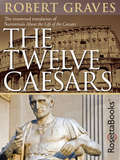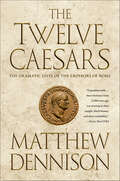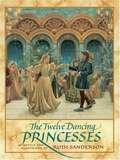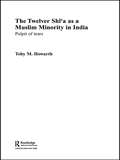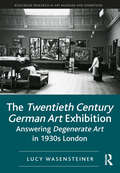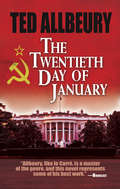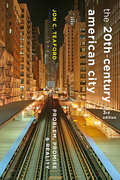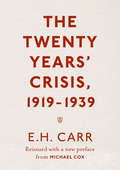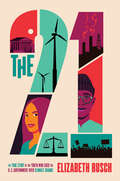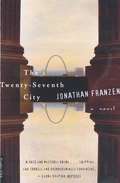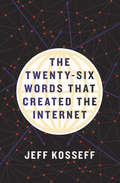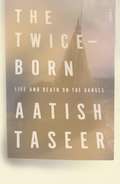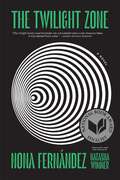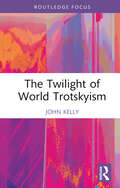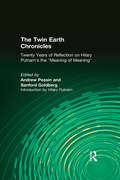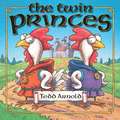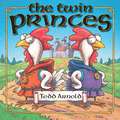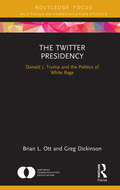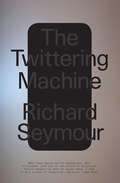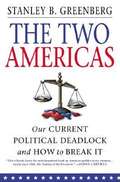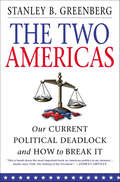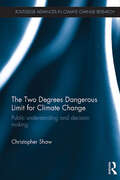- Table View
- List View
The Twelve Caesars
by Robert GravesThis ancient biographical history of Roman rulers from Julius Caesar to Domitian is translated by the acclaimed classicists and author of I, Claudius. As personal secretary to Emperor Hadrian, the second century scholar Suetonius had unlimited access to the Roman Imperial archives. Drawing on this wealth of source material, he wrote a sweeping account of the lives of Rome&’s first twelve emperors. From the empire&’s most accomplished leaders, such as Julius Caesar and Augustus, to its most depraved and doomed rulers, such as Caligula and Nero, this ancient biographical study presents an enlightening and colorful picture of these historical figures from remote antiquity. This edition of The Twelve Caesars is translated from the Latin by the renowned classicist, historian, and historical novelist Robert Graves. With his expertise in classical history and talent for telling a lively story, Graves presents an excellent translation that makes this classic work accessible to modern audiences
The Twelve Caesars: The Dramatic Lives of the Emperors of Rome
by Matthew DennisonThis vivid history of Rome and its rulers “combines thoughtful reflection and analysis with gossipy irreverence in a bewitching cocktail” (Daily Express, UK).One was a military genius, one murdered his mother and fiddled while Rome burned, another earned the nickname “sphincter artist”. Six of them were assassinated, two committed suicide—and five were considered gods. They are known as the “twelve Caesars” —Julius Caesar, Augustus, Tiberius, Caligula, Claudius, Nero, Galba, Otho, Vitellius, Vespasian, Titus, and Domitian. Under their rule, from 49 BC to AD 96, Rome was transformed from a republic to an empire, whose model of regal autocracy would survive in the West for more than a thousand years.In The Twelve Caesars, Matthew Dennison offers a revealing and colorful biography of each emperor, triumphantly evoking the luxury, license, brutality, and sophistication of imperial Rome at its zenith. But beyond recreating the lives, loves, and vices of these despots, psychopaths and perverts, he paints a portrait of an era of political and social revolution, of the bloody overthrow of a five-hundred-year-old political system and its replacement by a dictatorship which, against all the odds, succeeded more convincingly than oligarchic democracy in governing a vast empire.
The Twelve Dancing Princesses
by Ruth SandersonRetells the tale of twelve princesses who dance secretly all night long and how their secret is eventually discovered.
The Twelver Shi'a as a Muslim Minority in India: Pulpit of Tears (Routledge Persian and Shi'i Studies)
by Toby HowarthOne of the most important current debates within and about Islam concerns its relation with power. Can Muslims be fundamentally content without power or as a minority? This book considers the voice of an important Muslim minority through its sermons. Indian Shi'i Muslims are a minority within a minority, constituting about ten to fifteen percent of the population as a whole, but comprising of about fifteen million people. Ten sermons are presented entirely and many more are quoted in order to analyze the preaching tradition in full. This book is the first survey to present the Indian mourning gathering and explain the history of this extraordinary phenomenon.
The Twentieth Century German Art Exhibition: Answering Degenerate Art in 1930s London (Routledge Research in Art Museums and Exhibitions)
by Lucy WasensteinerThis book represents the first study dedicated to Twentieth Century German Art, the 1938 London exhibition that was the largest international response to the cultural policies of National Socialist Germany and the infamous Munich exhibition Degenerate Art. Provenance research into the catalogued exhibits has enabled a full reconstruction of the show for the first time: its contents and form, its contributors and their motivations, and its impact both in Britain and internationally. Presenting the research via six case-study exhibits, the book sheds new light on the exhibition and reveals it as one of the largest émigré projects of the period, which drew contributions from scores of German émigré collectors, dealers, art critics, and from the ‘degenerate’ artists themselves. The book explores the show’s potency as an anti-Nazi statement, which prompted a direct reaction from Hitler himself.
The Twentieth Day of January: The Inauguration Day Thriller
by Ted Allbeury"Allbeury, like le Carré, is a master of the genre, and this novel represents some of his best work." — Booklist "A flawlessly structured plot." — Publishers Weekly"Uncannily predicted the rise of Donald Trump." — Slate.comIt's 1980 and the Cold War continues to rage. Seemingly out of nowhere, wealthy businessman Logan Powell has become President-elect and is only weeks away from assuming the most powerful position in the world on the twentieth day of January. Across the Atlantic, veteran British intelligence agent James MacKay uncovers shocking evidence that suggests something might be terribly wrong with the election. With the help of a reluctant CIA, MacKay sets out on a dangerous and daring mission to discover if the unthinkable has occurred: is President-elect Powell actually a puppet of the Soviet Union? Written by the bestselling author of The Crossing and Pay Any Price, this remarkably plausible thriller offers a heady mix of political intrigue and intense suspense — with the very future of America and the free world hanging in the balance. "Allbeury's novels have won a reputation not only for verisimilitude but for crisp, economical narration and high drama … there's no better craftsman." — Chicago Sun-Times"A most knowledgeable chronicler of espionage." — The New York Times Book Review "When I say Ted Allbeury knows where the bodies are buried I mean it literally. Truly a classic writer of espionage fiction." — Len Deighton, author of The Ipcress File
The Twentieth-Century American City: Problem, Promise, and Reality (The American Moment)
by Jon C. TeafordModern cities embody America’s successes and failures—while offering hope for the future.Throughout the twentieth century, the city was deemed a problematic space, one that Americans urgently needed to improve. Although cities from New York to Los Angeles served as grand monuments to wealth and enterprise, they also reflected the social and economic fragmentation of the nation. Race, ethnicity, and class splintered the metropolis both literally and figuratively, thwarting efforts to create a harmonious whole. The urban landscape revealed what was right—and wrong—with both the country and its citizens’ way of life. In this thoroughly revised edition of his highly acclaimed book, Jon C. Teaford updates the story of urban America by expanding his discussion to cover the end of the twentieth century and the first years of the next millennium. A new chapter on urban revival initiatives at the close of the century focuses on the fight over suburban sprawl as well as the mixed success of reimagining historic urban cores as hip new residential and cultural hubs. The book also explores the effects of the late-century immigration boom from Latin America and Asia, which has complicated the metropolitan ethnic portrait.Drawing on wide-ranging primary and secondary sources, Teaford describes the complex social, political, economic, and physical development of US urban areas over the course of the long twentieth century. Touching on aging central cities, technoburbs, and the ongoing conflict between inner-city poverty and urban boosterism, The Twentieth-Century American City offers a broad, accessible overview of America’s persistent struggle for a better city.
The Twenty Years' Crisis, 1919-1939: Reissued with a new preface from Michael Cox
by E.H. CarrE.H. Carr's Twenty Years' Crisis is a classic work in International Relations. Published in 1939, on the eve of World War II, it was immediately recognized by friend and foe alike as a defining work in the fledgling discipline. The author was one of the most influential and controversial intellectuals of the twentieth century. The issues and themes he develops in this book continue to have relevance to modern day concerns with power and its distribution in the international system. Michael Cox's critical introduction provides the reader with background information about the author, the context for the book, its main themes and contemporary relevance. Written with the student in mind, it offers a guide to understanding a complex, but crucial text.Now updated with a new preface from Michael Cox.
The Twenty-One: The True Story of the Youth Who Sued the U.S. Government Over Climate Change
by Elizabeth RuschCompelling and timely, award-winning author Elizabeth Rusch’s The Twenty-One tells the gripping inside story of the ongoing landmark federal climate change lawsuit, Juliana vs. United States of America. The Twenty-One is for readers of Christina Soontornvat’s All Thirteen, fans of Steve Sheinkin’s books, and anyone interested in the environment and climate change, as well as youth activism, politics and government, and the law. From severe flooding in Louisiana to wildfires in the Pacific Northwest to melting permafrost in Alaska, catastrophic climate events are occurring more frequently—and severely—than ever. And these events are having a direct impact on the lives (and futures) of young people and their families. In the ongoing landmark case Juliana vs. United States, twenty-one young plaintiffs claim that the government’s support of the fossil-fuel industry is actively contributing to climate change, and that all citizens have a constitutional right to a stable climate—especially children and young adults, because they cannot vote and will inherit the problems of the future.Elizabeth Rusch’s The Twenty-One is a gripping legal and environmental thriller that tells the story of twenty-one young people and their ongoing case against the U.S. government for denying their constitutional right to life and liberty. A rich, informative, and multifaceted read, The Twenty-One stars the young plaintiffs and their attorneys; illuminates the workings of the United States’s judicial system and the relationship between government, citizens’ rights, and the environment; and asks readers to think deeply about the future of our planet. Features extensive backmatter, including a timeline, glossary, call to action, additional resources, and photographs.
The Twenty-Seventh City
by Jonathan FranzenA classic of contemporary fiction, "The Twenty-Seventh City" shows us an ordinary metropolis turned inside out, and the American Dream unraveling into terror and dark comedy.
The Twenty-Six Words That Created the Internet
by Jeff Kosseff"No provider or user of an interactive computer service shall be treated as the publisher or speaker of any information provided by another information content provider."Did you know that these twenty-six words are responsible for much of America's multibillion-dollar online industry? What we can and cannot write, say, and do online is based on just one law—a law that protects online services from lawsuits based on user content. Jeff Kosseff exposes the workings of Section 230 of the Communications Decency Act, which has lived mostly in the shadows since its enshrinement in 1996. Because many segments of American society now exist largely online, Kosseff argues that we need to understand and pay attention to what Section 230 really means and how it affects what we like, share, and comment upon every day.The Twenty-Six Words That Created the Internet tells the story of the institutions that flourished as a result of this powerful statute. It introduces us to those who created the law, those who advocated for it, and those involved in some of the most prominent cases decided under the law. Kosseff assesses the law that has facilitated freedom of online speech, trolling, and much more. His keen eye for the law, combined with his background as an award-winning journalist, demystifies a statute that affects all our lives –for good and for ill. While Section 230 may be imperfect and in need of refinement, Kosseff maintains that it is necessary to foster free speech and innovation. For filings from many of the cases discussed in the book and updates about Section 230, visit jeffkosseff.com
The Twice-Born: Life and Death on the Ganges
by Aatish TaseerIn The Twice-Born, Aatish Taseer embarks on a journey of self-discovery in an intoxicating, unsettling personal reckoning with modern India, where ancient customs collide with the contemporary politics of revivalism and revengeWhen Aatish Taseer first came to Benares, the spiritual capital of Hinduism, he was eighteen, the Westernized child of an Indian journalist and a Pakistani politician, raised among the intellectual and cultural elite of New Delhi. Nearly two decades later, Taseer leaves his life in Manhattan to go in search of the Brahmins, wanting to understand his own estrangement from India through their ties to tradition.Known as the twice-born—first into the flesh, and again when initiated into their vocation—the Brahmins are a caste devoted to sacred learning. But what Taseer finds in Benares, the holy city of death also known as Varanasi, is a window on an India as internally fractured as his own continent-bridging identity. At every turn, the seductive, homogenizing force of modernity collides with the insistent presence of the past. In a globalized world, to be modern is to renounce India—and yet the tide of nationalism is rising, heralded by cries of “Victory to Mother India!” and an outbreak of anti-Muslim violence.From the narrow streets of the temple town to a Modi rally in Delhi, among the blossoming cotton trees and the bathers and burning corpses of the Ganges, Taseer struggles to reconcile magic with reason, faith in tradition with hope for the future and the brutalities of the caste system, all the while challenging his own myths about himself, his past, and his countries old and new.
The Twilight Struggle: What the Cold War Teaches Us about Great-Power Rivalry Today
by Hal BrandsA leading historian&’s guide to great-power competition, as told through America&’s successes and failures in the Cold War&“If you want to know how America can win today's rivalries with Russia and China, read this book about how it triumphed in another twilight struggle: the Cold War.&”— Stephen J. Hadley, national security adviser to President George W. Bush The United States is entering an era of great-power competition with China and Russia. Such global struggles happen in a geopolitical twilight, between the sunshine of peace and the darkness of war. In this innovative and illuminating book, Hal Brands, a leading historian and former Pentagon adviser, argues that America should look to the history of the Cold War for lessons in how to succeed in great-power rivalry today. Although the threat posed by authoritarian powers is growing, America&’s muscle memory for dealing with dangerous foes has atrophied in the thirty years since the Cold War ended. In long-term competitions where the diplomatic jockeying is intense and the threat of violence is omnipresent, the United States will need all the historical insight it can get. Exploring how America won a previous twilight struggle is the starting point for determining how America can successfully prosecute another high-stakes rivalry today.
The Twilight Zone: A Novel
by Nona Fernández* Finalist for the National Book Award for Translated Literature *An engrossing, incantatory novel about the legacy of historical crimes by the author of Space InvadersIt is 1984 in Chile, in the middle of the Pinochet dictatorship. A member of the secret police walks into the office of a dissident magazine and finds a reporter, who records his testimony. The narrator of Nona Fernández’s mesmerizing and terrifying novel The Twilight Zone is a child when she first sees this man’s face on the magazine’s cover with the words “I Tortured People.” His complicity in the worst crimes of the regime and his commitment to speaking about them haunt the narrator into her adulthood and career as a writer and documentarian. Like a secret service agent from the future, through extraordinary feats of the imagination, Fernández follows the “man who tortured people” to places that archives can’t reach, into the sinister twilight zone of history where morning routines, a game of chess, Yuri Gagarin, and the eponymous TV show of the novel’s title coexist with the brutal yet commonplace machinations of the regime.How do crimes vanish in plain sight? How does one resist a repressive regime? And who gets to shape the truths we live by and take for granted? The Twilight Zone pulls us into the dark portals of the past, reminding us that the work of the writer in the face of historical erasure is to imagine so deeply that these absences can be, for a time, spectacularly illuminated.
The Twilight of Unionism: Ulster and the Future of Northern Ireland
by Geoffrey BellThe crisis of Ulster Unionism and the future of Northern IrelandThe fissures that have split the United Kingdom in the last decades have run through Northern Ireland. Since the 1998 Good Friday Agreement, the fragile peace has been threatened by Brexit, the rise and fall of the D U P and the failure of power-sharing arrangement between the main parties at the Stormont Assembly. As the very future of Northern Ireland is now in jeopardy, will Britain face up to its imperial legacy and address the deep inequalities that remain in the aftermath of the Troubles, and the uneven development of the 'New Ireland'?Geoffrey Bells offers an insightful history of Ulster Unionism from the 1960s to the present day. In recent years this has come to a crisis point. What is the future of the Union in the post-Brexit reality? How will the relationship between Northern Ireland and Westminster develop? Can the United Kingdom survive?
The Twilight of World Trotskyism (Routledge Studies in Radical History and Politics)
by John KellyThe Twilight of World Trotskyism analyzes the reasons behind the historic failure of the Trotskyist movement around the world. The book begins this assessment by briefly recapitulating the origins of Trotskyism, as a political current within the communist movement, and elaborating its major elements, before describing the historical development of Trotskyism in the four countries where it has sunk the deepest roots and which house the clear majority of the world’s Fourth Internationals: Argentina, Britain, France and the USA. It then proceeds to map the current state of the global Trotskyist movement. Whatever their current size and status, Trotskyist organizations aspire to become mass political parties and lead revolutionary seizures of power. It is therefore appropriate to examine them through the metrics applied to mainstream parties, namely organization, membership and political influence. The author looks at the dynamics of the Trotskyist movement, focusing in particular on the supposedly harmful effects of the communist movement before then turning to examine the role of Trotskyist organizations in the many revolutionary situations that have appeared since the 1920s and in the various ‘cycles of protest’ that have occurred in the latter half of the 20th century and the early years of the 21st century. The final section examines the two success stories frequently cited in Trotskyist literature, namely the cases of Bolivia and Sri Lanka. The book concludes by setting out and examining a wide variety of explanations for the chronic and sustained weaknesses of the Trotskyist movement, including its flawed appraisals of contemporary politics and economics, ultra-radical programmes and policies, failures in understanding the dynamics of protest and the baleful legacy of Soviet communism. It is argued that these weaknesses are rooted in Trotskyist doctrine and are therefore integral, not peripheral, features of world Trotskyism. This volume will be essential reading for activists and scholars interested in the transnational history and politics of the radical left.
The Twin Earth Chronicles: Twenty Years of Reflection on Hilary Putnam's the "Meaning of Meaning"
by Andrew Pessin Sanford GoldbergIn 1975, Putnam published a paper called The Meaning of 'Meaning', which challenged the orthodox view in the philosophies of language and mind. The article's Twin Earth conclusions about meaning, thought and knowledge were shocking. This work contains writings on the subject of Twin Earth.
The Twin Princes
by Tedd ArnoldRiddle me this . . . Why does Old King Chanticleer worry about his two sons, Henry and Fowler? Because they are twins, and he can't decide which prince should inherit his throne. And so he plans a horse race--one that will determine the next king. But this race is an unusual one, and it will take cleverness, not just speed, to become the winner. With puns on every page, the classic battle of hero versus villain, and even a riddle for the reader to solve, this featherbrained fairy tale is exuberant, goofy, irresistible fun.
The Twin Princes
by Tedd ArnoldWhy did Old King Chanticleer worry about his two sons? Because they were twins, and he could not decide which prince should inherit his throne. And so he planned a horse race-one that would determine the next king. But this race was an unusual one: The brother whose horse was last to cross the finish line would be the winner. How in the world could they finish this strange race? With puns on every page, exuberantly goofy artwork, the classic battle of hero versus villain, and even a riddle for the reader to solve, this featherbrained story is terrifically clever fun.
The Twitter Presidency: Donald J. Trump and the Politics of White Rage (NCA Focus on Communication Studies)
by Brian L. Ott Greg DickinsonThe Twitter Presidency explores the rhetorical style of President Donald J. Trump, attending to both his general manner of speaking as well as to his preferred modality. Trump’s manner, the authors argue, reflects an aesthetics of white rage, and it is rooted in authoritarianism, narcissism, and demagoguery. His preferred modality of speaking, namely through Twitter, effectively channels and transmits the affective dimensions of white rage by taking advantage of the platform’s defining characteristics, which include simplicity, impulsivity, and incivility. There is, then, a structural homology between Trump’s general communication practices and the specific platform (Twitter) he uses to communicate with his base. This commonality between communication practices and communication platform (manner and modality) struck a powerful emotive chord with his followers, who feel aggrieved at the decentering of white masculinity. In addition to charting the defining characteristics of Trump’s discourse, The Twitter Presidency exposes how Trump’s rhetorical style threatens democratic norms, principles, and institutions.
The Twittering Machine
by Richard SeymourA brilliant probe into the political and psychological effects of our changing relationship with social mediaFormer social media executives tell us that the system is an addiction-machine. We are users, waiting for our next hit as we like, comment and share. We write to the machine as individuals, but it responds by aggregating our fantasies, desires and frailties into data, and returning them to us as a commodity experience. The Twittering Machine is an unflinching view into the calamities of digital life: the circus of online trolling, flourishing alt-right subcultures, pervasive corporate surveillance, and the virtual data mines of Facebook and Google where we spend considerable portions of our free time. In this polemical tour de force, Richard Seymour shows how the digital world is changing the ways we speak, write, and think. Through journalism, psychoanalytic reflection and insights from users, developers, security experts and others, Seymour probes the human side of the machine, asking what we&’re getting out of it, and what we&’re getting into. Social media held out the promise that we could make our own history–to what extent did we choose the nightmare that it has become?
The Two Americas: Our Current Political Deadlock and How to Break It
by Stanley B. GreenbergThe 2000 presidential left the world standing still, but it was no fluke. America is divided right down the middle - the product of a half-century, unique in our country's history, of inconclusive, increasingly heated partisan battle. Tantalizingly close to victory, each party inflames and mobilizes its most loyal supporters and battles to gain even a small edge with some contested groups. Politics has become culture war - a fight about values, faith, the family, how people should live their lives. The result: partisans are more partisan, politics more polarized, America more divided. The Two Americas: Our Current Political Deadlock and How to Break It tells the history of each party's failed efforts to dominate the era's politics and ideas, radically changing the political landscape. The book provides an in-depth guide to the new groups at the center of our politics. Internationally renowned political strategist and pollster Stanley Greenberg puts the reader in the room with the strategists and politicians and shows how each party can win, even shatter the impasse. The Two Americas is a political primer and strategic playbook for this unique era - essential reading for any armchair political strategist or engaged citizen eager to understand our future politics.
The Two Americas: Our Current Political Deadlock and How to Break It
by Stanley B. GreenbergThe 2000 presidential left the world standing still, but it was no fluke. America is divided right down the middle - the product of a half-century, unique in our country's history, of inconclusive, increasingly heated partisan battle. Tantalizingly close to victory, each party inflames and mobilizes its most loyal supporters and battles to gain even a small edge with some contested groups. Politics has become culture war - a fight about values, faith, the family, how people should live their lives. The result: partisans are more partisan, politics more polarized, America more divided.The Two Americas: Our Current Political Deadlock and How to Break It tells the history of each party's failed efforts to dominate the era's politics and ideas, radically changing the political landscape. The book provides an in-depth guide to the new groups at the center of our politics. Internationally renowned political strategist and pollster Stanley Greenberg puts the reader in the room with the strategists and politicians and shows how each party can win, even shatter the impasse.The Two Americas is a political primer and strategic playbook for this unique era - essential reading for any armchair political strategist or engaged citizen eager to understand our future politics.
The Two Churches: Catholicism and Capitalism in the World System
by Michael L. BuddeThe single most important change now well under way within Catholicism is its transition from a First World to a Third World entity. How this enormous shift will affect the Catholic church's role in the world economy is the subject of Michael L. Budde's book, the first world systems study of the mutual interaction of religion and political economy in the 1990s.Budde's argument here is twofold. He contends that world Catholicism, led by its Third World majority (most notably in Latin America), will continue to develop in an increasingly anticapitalist direction; and he suggests that once-dominant First World Catholic churches (exemplified by the U.S. Catholic church), are poorly placed to respond in solidarity with their coreligionists from the Third World.Covering a wide range of theoretical and substantive matters, The Two Churches examines religion as a source of both social legitimation and social rebellion. It demonstrates the importance of ecclesiology, a branch of theology dealing with "theories of the church," and it highlights the effect of capitalism on world Catholicism, as well as the latter's influence on the development of the capitalist order.In his original, far-reaching analysis of the Catholic church's role in world affairs, Budde revises current views of religious institutions as subordinate social phenomena. By relating developments in the world political economy to material conditions in the Third World and in turn to the practice of Catholicism, he reveals how the Catholic church functions as a worldwide institution. He also shows how core-periphery conflicts within the church affect transnational capitalism.As the Third World becomes more and more volatile, and as its relations with the First World further complicate the politics of the Catholic church, the questions addressed in The Two Churches demand attention with increasing urgency. Timely, thoughtful, and lucid, this book will inform and enhance our understanding of this complex, pressing issue.
The Two Degrees Dangerous Limit for Climate Change: Public Understanding and Decision Making (Routledge Advances in Climate Change Research)
by Christopher ShawThis book is about the history, present and future of one the most important policy ideas of the modern era – that there is a single, global dangerous amount of climate change. That dangerous amount of climate change is imagined as two degrees centigrade of global warming above the pre-industrial average. Though the two degree idea is based on the value system of elite policy actors, it is been constructed in public discourses as scientific fact. This false representation of the concept undermines opportunities for positive public engagement with the climate policy debate, yet it is strong public engagement which is a recurring aspiration of climate policy discourses and is considered essential if climate mitigation strategies are to work. Alongside a critical analysis of how the idea of a single dangerous limit has shaped our understanding of what sort of problem climate change is, the book explains how the public have been kept out of that decision making process, the implications of this marginalisation for climate policy and why the dangerous limit idea is undermining our ability to mitigate climate change. The book concludes by exploring possibilities for a deliberation about the future of the two degree limit which allows for public participation in the decision making process. This book illustrates why, at this critical juncture in the climate policy debate, the two degree limit idea has failed to achieve any of the policy goals intended. This is the first book dedicated to questioning the issue of the two degree limit within a social science framework and should be of interest to students and scholars of environmental policy and politics, climate change communication, and science, technology and society studies.
